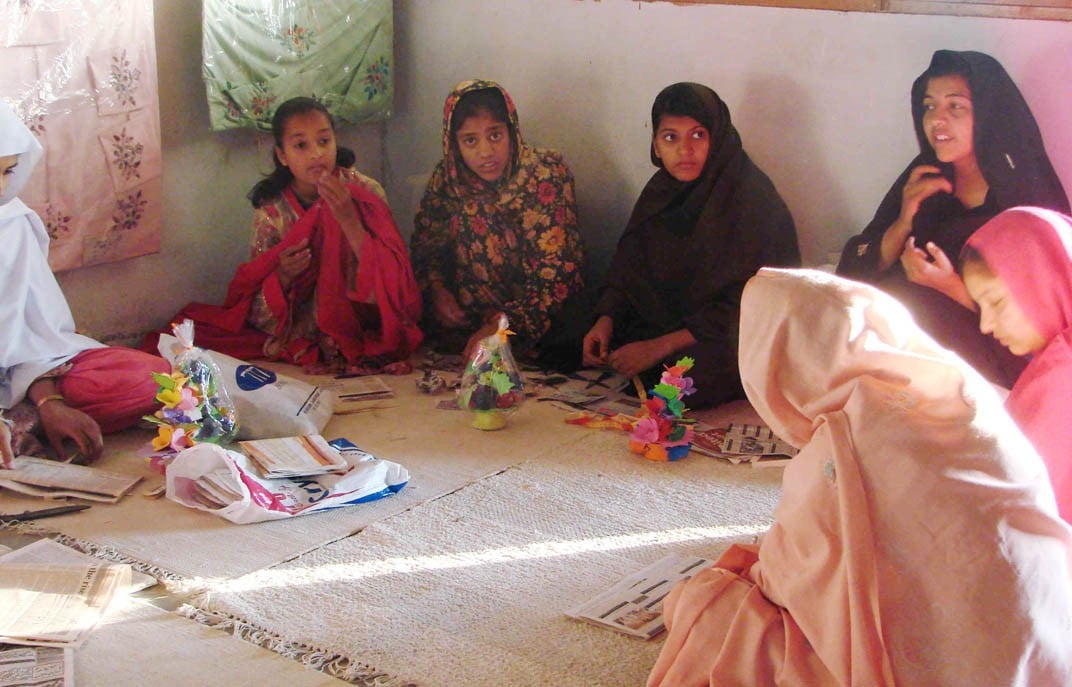
There is need to educate 10-16 year olds who are missing from the government’s literacy programme

More than 781 million illiterate people in Pakistan are above 10 year-old. In Punjab, 30 million people above 10-year-old are illiterate and out of these two thirds are women. In Pakistan, the number of illiterates varies between five to six crore and it is a big challenge because Pakistan’s population is rapidly increasing -- 4.3 births per second.
Article 25-A of the Constitution of Pakistan guarantees the right to free and compulsory education to all children between 5 and 16 years while the government’s development agenda for schools has its focus on children between 5 and 10 years. Where will 10-16 year-olds go?
Shaheen Attiqur Rehman, a social worker, politician and educationist, asks the government to pay attention to educating those who are left out of school, including mothers. Bunyad, an NGO which Rehman heads, is educating people in the age bracket of 10-16 years throughout Punjab but it is for the government to do. "Alif Ailan is doing a good job. They are educating children in age group of 5-9 years but there is need to educate 10-16 year olds as well. Nobody is bothered," she says.
"We have few alternatives to teach youth to read and write. If you don’t teach youth you will be left behind. In a few years even Afghanistan will leave us behind," she says.
Bunyad has helped teachers open 40 secondary schools in Punjab, that is, from class 6 and up by giving them loans and technical support. There is a college as well in Sialkot opened that way. The teachers are earning as well.
She contends that mothers of children aged between five and nine can be taught enough language and arithmetic to help their children with homework and studies in just 480 hours of teaching. "This can be achieved in one year. In a year mothers can be easily taught to read newspapers and do their arithmetic."
"We have one plus point. More than 80 per cent women are Quran literate by rote. Teaching Urdu to them is not difficult because they have read the Qaeda. I give people translation of Quran to read -- that also gives them good moral education. Our religion is very equity conscious but we have taken the worst from every culture," she says.
Democracy will be there when people will have literacy and will make informed decisions. Literacy programmes have to be need based. When it is so, people are quick to pick up what they are taught. Everyone wants to overcome poverty. "We have taught two lakh mothers so far but what is this number in 3 crore. I taught them Alif se Allah and Bae se bae bae -- that which they can relate to," says Shaheen Attiqur Rehman.
In India, basic education has become a non-political thing. "When we will think of this country as our own, will we be able to do something for it. When local elected bodies will own the schools of their districts only then will education improve," she believes.
The government has made District Education Authorities (DEA). In near future with the local government system in place, DEAs will be handling administrative and establishment matters. The fear is that they will be too politicised and won’t work.
"I have no agenda. Pakistan can only go ahead when people will come first. Education is to improve the vision to become in-charge of your life and improve it. It is not for a job. If it is only for a job we are in a mess."
A student doing MBA from a government institute in Lahore, Saba Idrees, who works in a private organisation in the morning and goes to university in the evening, says a huge population does not have access to education. "People in the low income group are struggling hard to make ends meet. You don’t find a house on rent in Rs13,000 -- minimum wage fixed by the government. Education comes after a roof over our head."
"Only a child who comes from a household where the income is Rs40,000 can pay the fee. How will a child coming from Rs12,000 income household pay the fee. Do we have any solution to their problems? Can we help them study?"
Yes, we can. In the oldest homeopathic college of Lahore, Pakistan Homeopathic College and Hospital, the dean has evolved a system wherein all students and faculty contribute to a common pool from where the needy students’ expenses are met. Others can contribute too.